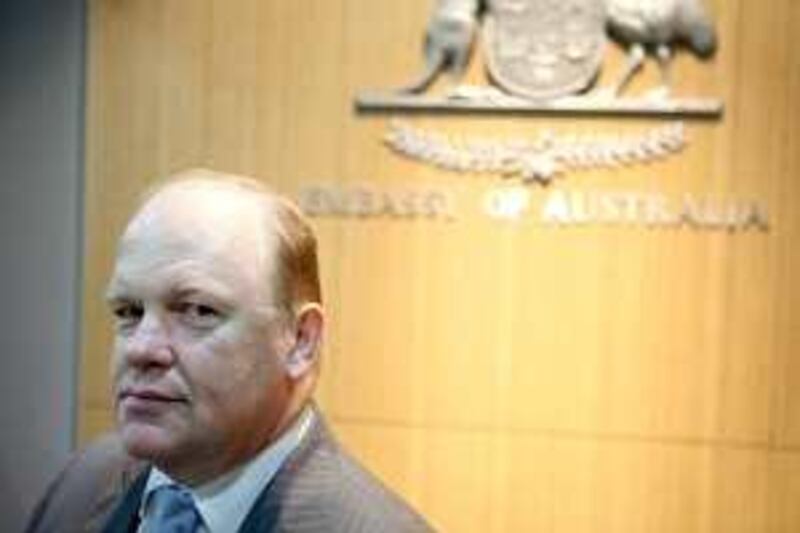Abu Dhabi // When Jeremy Bruer arrived in Abu Dhabi as the new Australian ambassador to the UAE, he expected his job to focus on trade and commercial ties between the two countries. Four years on, and with just a month to go before the end of his posting, Mr Bruer has seen the relationship expand into environmental, political and military co-operation.
"I came here expecting the job to be almost solely commercially focused and with a dollop of trade policy thrown in," he said. "I was pleasantly surprised to find the different strands that existed within that relationship. "It has developed into a relationship which has a lot of political strands to it. We have a lot of shared interests in regional and global security issues and we work together, share experiences and co-operate with each other.
"It has become an important relationship in its own right." The past 12 months have been particularly active and Mr Bruer, who also acts as ambassador to Qatar, recently announced the Australian government's plans to consolidate its military presence in the region. Since December, 250 Australian Defence Force staff have been stationed at Al Minhad Air Base in Dubai ? where the force's regional military headquarters is based. This is expected to increase to 500 by the beginning of next year.
The Australian prime minister, Kevin Rudd, the foreign minister, Stephen Smith, and the governor-general, Quentin Bryce, have all visited the UAE in the past year. Ms Bryce was among the keynote speakers at the Future Energy Summit in January, the same month that Masdar, Abu Dhabi's future energy initiative, became a founding member of the Australian-led Global Carbon Capture and Storage Institute.
Australia was also among the countries that actively supported the Emirates' successful bid to host the International Renewable Energy Agency and Mr Bruer regards the environmental issue as one on which the two countries will continue to co-operate. "We are both countries that exist in harsh and fragile environments. We therefore understand how important it is to be careful with those environments," he said.
"Our government has been very impressed by the commitment that UAE leaders have shown to developing responses to current global environmental challenges." Similarly, the UAE's pursuit of civil nuclear energy was another area for future co-operation, and one that could be a model for other countries in the region to follow, said Mr Bruer, pointing out that Australia had the world's largest uranium deposits.
"We think that [the UAE is] providing an example to other countries in the region about how to go about pursuing civil nuclear power in a transparent manner and being consistent with international guidelines," he said. "We admire them for providing that model and we hope others see that as a good example to follow." The inaugural Australia-UAE Dialogue took place in the capital in March, bringing together business, government, media and academic leaders from both countries to discuss bilateral relations and common challenges.
There are a number of areas which Mr Bruer views as potential sources of future co-operation, including in efforts to combat human trafficking. "I think we have a mutual and in some ways a complimentary interest in working together to combat it," he said. The 15,000 Australian expatriates in the UAE were a "very important part of the relationship", said Mr Bruer, who voiced pride that his compatriots were among those "making a contribution" to the country.
The ambassador has also spoken out in support of the UAE in his home country, challenging stereotypes and alerting people to his experiences of a "very welcoming, tolerant and open society". According to Mr Bruer, there are "no major points of contention" in the relationship between the countries, which he described as "very positive and constructive". "Misunderstandings between us are rare and we are able to clear them up quickly because of the open channels," said Mr Bruer.
Mr Bruer, married with four children, comes from Adelaide. He has been deputy head of mission at the Australian embassy in Riyadh and, immediately before his current posting, was director of the Department of Foreign Affairs' Iraq Rehabilitation Unit. His next assignment is expected be at the department's headquarters in the Australian capital, Canberra. Mr Bruer's successor in Abu Dhabi has not been officially named.
zconstantine@thenational.ae






